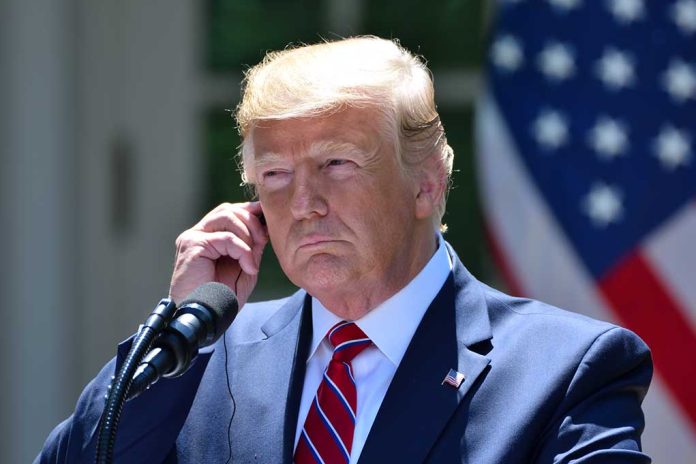
President Trump’s sweeping $9.4 billion rescissions package targets NPR and PBS funding while slashing billions from foreign aid programs, fulfilling a key campaign promise to eliminate “waste and garbage” in government spending.
Key Takeaways
- Trump’s Department of Government Efficiency (DOGE) has proposed $9.4 billion in spending cuts targeting public broadcasting ($1.1 billion) and foreign aid ($8.3 billion)
- The rescissions package can bypass the Senate filibuster and pass with a simple majority within a 45-day window
- House Speaker Mike Johnson supports the initiative and plans to act quickly to codify the cuts once received
- NPR has sued the Trump administration over an executive order to end taxpayer funding for media outlets accused of biased coverage
- The package is part of broader Trump administration efforts that include the “One Big Beautiful Bill” projected to save $1.6 trillion
Trump Targets Public Broadcasting and Foreign Aid for Significant Cuts
The Trump administration is taking decisive action to reduce government waste by targeting $9.4 billion in cuts to public broadcasting and foreign aid. Budget Director Russ Vought confirmed that the rescissions package will focus on eliminating “waste and garbage” from the U.S. Agency for International Development (USAID) and foreign aid programs, which account for $8.3 billion of the proposed cuts. The remaining $1.1 billion targets the Corporation for Public Broadcasting (CPB), which provides funding to NPR and PBS, fulfilling Trump’s long-standing promise to reduce taxpayer funding for media organizations he views as biased.
The cuts to public broadcasting come after President Trump signed an executive order to end federal funding for PBS and NPR, citing concerns over journalistic independence and the current media landscape. “Government funding of news media in this environment is not only outdated and unnecessary but corrosive to the appearance of journalistic independence,” the order reads,” said Trump.
Congress Has 45 Days to Act on Rescissions Package
The Trump administration’s strategy leverages a powerful budgetary tool that gives Congress 45 days to reclaim previously appropriated funding through a streamlined process. Unlike typical legislation that can be blocked by Senate filibuster, this package can pass with a simple majority in both chambers. House Speaker Mike Johnson has already signaled his strong support for the initiative, which is being implemented through the Department of Government Efficiency (DOGE) led by Elon Musk. The Speaker has made it clear he intends to move quickly once the package arrives.
“When the White House sends its rescissions package to the House, we will act quickly by passing legislation to codify the cuts,” said Johnson, in a Wednesday post on X.
Budget Director Vought has indicated that the administration is working closely with congressional leadership to ensure the package can successfully pass the House. “We’ve had good conversations to make sure they knew it was coming,” said Vought, “They had some input as to some of the changes that could be made to make it something that could pass the House. And we’re excited for that to occur next week.”
NPR Pushes Back Against Funding Cuts
NPR has taken the extraordinary step of suing the Trump administration over the executive order to end taxpayer funding for media outlets accused of biased news coverage. While NPR and PBS receive most of their funding from non-governmental sources, the Corporation for Public Broadcasting provides approximately $535 million annually, with smaller local stations being most vulnerable to the proposed cuts. Critics of public broadcasting funding have long argued that with today’s diverse media landscape, taxpayer subsidies for media organizations are unnecessary.
“At the very least, Americans have the right to expect that if their tax dollars fund public broadcasting at all, they fund only fair, accurate, unbiased, and nonpartisan news coverage,” Trump continued. “No media outlet has a constitutional right to taxpayer subsidies, and the government is entitled to determine which categories of activities to subsidize.”
DOGE Faces Challenges in Government Efficiency Push
The Department of Government Efficiency, led by Elon Musk, has faced significant challenges in its mission to streamline government operations and reduce wasteful spending. Musk has described the effort as an “uphill battle trying to improve things,” noting that DOGE is often blamed for unrelated issues. Despite these challenges, the rescissions package represents a concrete step toward fulfilling the administration’s promise to reduce wasteful government spending and address the federal deficit. While the $9.4 billion in proposed cuts is less than what many conservatives had hoped for, it marks an important start.
The rescissions package is part of a broader fiscal strategy that includes Trump’s “One Big Beautiful Bill,” which aims to save $1.6 trillion, though questions remain about its potential impact on the federal deficit. Despite passing by a narrow margin, the administration remains committed to its agenda of government efficiency and fiscal responsibility through targeted spending cuts to programs it views as wasteful or politically biased. With Speaker Johnson’s support and the simplified passage requirements, the rescissions package stands a strong chance of becoming law within the 45-day window.



